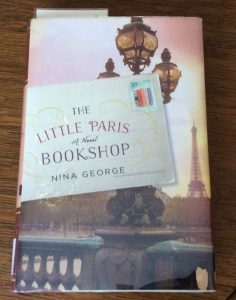Jen Gilroy's Blog, page 18
May 18, 2018
Important GDPR and blog subscription information
Dear readers,
As some of you know, the European Union (EU) is introducing the new General Data Protection Regulation (GDPR) which comes into effect on 25 May 2018.
I’m based in North America, but EU residents subscribe to my blog mailings. As such, and to ensure compliance with this new regulation, I’m sending a message to all subscribers to update you on some important information about your subscription, as well as how data collected from you is used.
Although I hope you enjoy receiving my blog (sent out every two weeks), this message is a reminder that since you opted-in to receive my blog via email, you can also opt out at any time via the “unsubscribe now” link at the very bottom of this, or future emails.
Please also be aware that there is a new privacy policy on my website outlining details of the collection, use and disclosure of personal information you supplied as part of subscribing to my blog. For further information, please read this policy here: http://www.jengilroy.com/privacy-policy/
If you also subscribe to my author newsletter (sent out quarterly and/or when I have new book news), I sent a similar message to those subscribers on Thursday, 17 May 2018.
Thank you for reading my blog, and for your continued interest in my books and writing life. If you have questions related to this message or how I collect and handle your personal data, please contact me at jen@jengilroy.com
Best wishes,
Jen
May 10, 2018
Advice for life after the happy ending
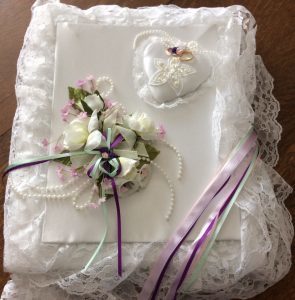 In romantic fiction, happy endings are a given. However, one of the reasons I enjoy writing (and reading) epilogues, as well as books in a series, is because I can dip into the lives of characters after the main story ends and they’re living their happy ever after (HEA).
In romantic fiction, happy endings are a given. However, one of the reasons I enjoy writing (and reading) epilogues, as well as books in a series, is because I can dip into the lives of characters after the main story ends and they’re living their happy ever after (HEA).
In the book I’m currently writing, the heroine’s mother gives her advice about love and marriage. As such, I’ve thought about some of the motherly (and grandmotherly) advice I’ve received—words of wisdom that still impact my life and, sometimes, also make their way into my fiction.
Don’t worry about the wedding, worry about the marriage
Marriage is hard work but thanks to that work, I’ve learned lessons about myself, as well as the man I married.
While I’ll never be the most patient person, I’ve learned to be more flexible and compromise for the greater good.
I’ve also learned about teamwork, although with Tech Guy that doesn’t extend to sharing a closet, a suitcase, or taking ballroom dancing lessons together. Compromise only goes so far and I have my limits—and he knows them!
Choose a man who will wear well in the wash
Like fast fashion, flashy men come and go, but for durability and longevity, the man who is good husband material is like a piece of classic tailoring—suitable for all life seasons and able to withstand even the strongest storms.
Tech Guy was my rock through a difficult pregnancy with English Rose, the deaths of both my parents, work crises large and small and, for an endless fifteen months, an unexpected long-distance marriage. He’s also my strength and comfort in helping English Rose cope with a debilitating (and currently incurable) chronic medical condition. 
There’s a bit of his stability and goodness in every hero I write, and through storms that would have felled many lesser men, he hasn’t wavered.
Like Sean Carmichael, the hero of my first book, The Cottage at Firefly Lake, my Tech Guy “has broad shoulders, and there’s no shame in leaning on those shoulders” when I need to.
You catch more flies with honey than vinegar
Kind words reinforce a loving bond; harsh words weaken it.
While Tech Guy isn’t the best or most voluble communicator, I know he always means well. And just as he tries to find the best in me, I seek the best in him even under trying circumstances—such as his reluctance to ask for directions.
Like all couples, we disagree (and if he ever remembers to tuck his chair back under a table after a meal it will be a minor miracle), but we also don’t go to bed angry with each other.
Hope for the best, but prepare for the worst
 After the wedding cake is eaten, the dress packed away, and photos tucked in an album, real life, with its twists, turns and potholes beckons.
After the wedding cake is eaten, the dress packed away, and photos tucked in an album, real life, with its twists, turns and potholes beckons.
As my mother often said, “it’s good we can’t see what lies ahead.” Life and sometimes tragedy happen, and few couples will celebrate fifty-six years of marriage as two members of my church community did several weeks ago.
Yet, no matter what the future brings, I’m blessed to have Tech Guy by my side. And on 13 May, we’ll mark the twenty-third anniversary of our engagement, the beginning of our own HEA journey.
At a hospital appointment several months ago, I watched as an elderly man gently pushed his frail, grey-haired wife in a wheelchair. Seeing those two together, still very much in love, reminded me of what I hope for in my own life.
Not a romance novel, but lifelong love, trust, respect, and devotion—the happiest HEA of all.
April 26, 2018
Joining a book club
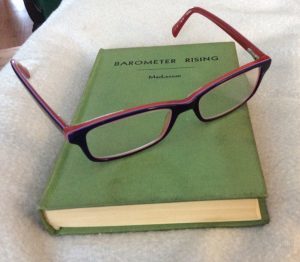 Long before I became a writer, I was a reader. From childhood until today, books have been my comfort, joy and inspiration.
Long before I became a writer, I was a reader. From childhood until today, books have been my comfort, joy and inspiration.
The library is one of my happy places, and when life hurts, I return to the pages of my favorite books, finding solace there only well-loved characters can give.
However, despite being a lifelong reader, I only joined a book club this year, at the urging of a friend who sings in my choir. And now all I can say is why did it take me so long?!
Reading outside my genre
As an author, reading is my “job” and although I read widely in women’s fiction and contemporary romance, I don’t have much time to read beyond that.
Book club reading stretches my reading menu and “cleanses my palate” to come back to my usual reading fare refreshed and inspired.
In the past three months, book club picks included The Mistress of Nothing by Kate Pullinger, Barometer Rising by Hugh MacLennan, and The Little Paris Bookshop by Nina George.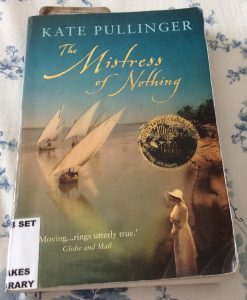
These different reading experiences—from Pullinger’s account of an Englishwoman and her maid in Victorian Egypt (based on a true story), to MacLennan’s “romantic realist” novel of the 1917 Halifax explosion, and then a bookish France in George’s story—were not only thought-provoking but also helped me look at my own writing in new ways.
Book chat…with tea and cake
Before I joined a book club, my reading was largely solitary and I rarely talked about books I’d read with anyone else.
Now I can share my passion for books and reading with a similarly enthusiastic group of women who, as an added bonus, serve tea and cake, a staple of my life in England.
Laughter and life lessons
My book club members are of various ages, backgrounds and life experiences.
Some are widowed or have husbands with medical challenges, or are dealing with their own health issues or family difficulties. Although they might have reasons to be sad, they’re upbeat, forthright, amusing and good company.
As one member with beautiful snow-white hair (the hair I want when I’m her age!) joked about an accident on her recent Caribbean holiday: “Remember, I fell on my way into the bar, not my way out!”
No matter what their life stage or context, these women have collective wisdom to benefit and enrich me.
Perhaps most important of all, at my book club, I’m a reader like everyone else.
Although I love my author life, it’s freeing to read one book a month solely for pleasure and talk about that book without being in full-on “author mode.”
Every writer should also be a reader, but sometimes I want to be a reader first, and my book club gives me a place to do that.
I may have discovered the joys of a book club late, but I’m now a happy convert! Do you belong to a reading group? Can you suggest any books my club might enjoy reading?
April 12, 2018
Prayers for Humboldt
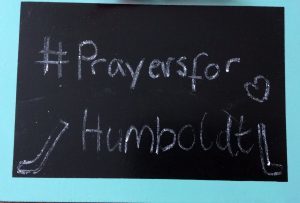 A week ago, on a remote Saskatchewan highway, sixteen people were killed and thirteen others injured in a crash between a semi-trailer truck and a bus carrying players, coaches, a trainer, a local radio announcer and others associated with a Canadian junior (ice) hockey team, the Humboldt Broncos.
A week ago, on a remote Saskatchewan highway, sixteen people were killed and thirteen others injured in a crash between a semi-trailer truck and a bus carrying players, coaches, a trainer, a local radio announcer and others associated with a Canadian junior (ice) hockey team, the Humboldt Broncos.
Before then, Humboldt was a small Canadian prairie town few people had heard of. However, in the past seven days, my social media feed has been dominated by #PrayersForHumboldt, #hockeyfamily, #HumboldtStrong and many other hashtags as people in Canada and around the world reach out in the wake of a tragedy that has rocked my country—and me—to the heart.
It hits close to home
In Canada, ice hockey is part of our national identity and in small towns particularly, “the rink” links people together in good times and bad.
Whether for hockey games or other sporting or school activities, bus travel on rural roads is part of almost every Canadian’s shared experience, mine included. It’s commonplace—except when it’s not.
Although in a different part of Canada, I live in a small town much like Humboldt. Here as there, players from the junior hockey team are billeted with local families, and many of those players attend English Rose’s school.
For these reasons and more, this tragedy feels both personal and heartbreakingly close.
Prairie people are inter-connected people
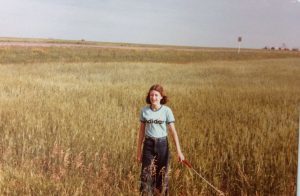 I grew up one province east of Saskatchewan, and small-town Saskatchewan is where my paternal grandparents met. My grandfather was a keen amateur hockey player and on their first date, he invited my grandmother to watch him play.
I grew up one province east of Saskatchewan, and small-town Saskatchewan is where my paternal grandparents met. My grandfather was a keen amateur hockey player and on their first date, he invited my grandmother to watch him play.
Hockey and the Canadian prairies are part of my history and once a prairie person, always a prairie person.
As Saskatchewan’s premier (like a US state governor) wrote on Twitter: “Our province has always been one community. At our core, we are one small town, neighbours, friends and families.”
In this vast and isolated region, where the edge of the flat land touches the tip of the big sky, people are tough, self-reliant, and down-to-earth, and the community spirit of the first pioneers endures. In our cities, people may not know the person who lives next door, but on the prairies, even though the nearest neighbour may be miles distant, people depend on each other in a special way.
Everyone knows someone, who knows someone, who knows someone else. The Broncos head coach was killed in the accident, and his widow went to school with the daughter of my choir director. The family names of the people riding that bus, of Ukrainian, Mennonite, French-Canadian origin and more, are reminiscent of my childhood.
They are my people and it is my place.
Family bonds, family tragedy
As a mum, my heart aches for the unimaginable pain the mothers, fathers and extended families of those killed and injured are experiencing.
When I heard how mothers cradled their dead and critically injured sons as though they were small boys, I hugged English Rose a little tighter and was reminded that I’m part of a bigger community of parents. When someone’s child hurts, we all do.
I’ve also been on the receiving end of a phone call telling me a loved one had been killed in a road accident and understand how life can change in an instant—and will never be the same again.
This kind of family tragedy sears your soul and although you go on, it’s something you may learn to live with but never truly “get over.”
My hockey book
 My December 2017 release, Back Home at Firefly Lake, is a hockey book. Although set in Vermont, USA, it was in part inspired by what ice hockey means in my own life and family.
My December 2017 release, Back Home at Firefly Lake, is a hockey book. Although set in Vermont, USA, it was in part inspired by what ice hockey means in my own life and family.
The story was shaped by my grandfather’s battered hockey skates, carefully kept by my grandmother until her death.
It was influenced by going to school with a boy who played junior hockey and, like the Humboldt players, road a team bus across the endless Manitoba prairie before realizing his childhood dream of reaching the NHL.
While I wrote Back Home at Firefly Lake, I heard the sounds of my childhood and adolescence—the scrape of ice skates against a frozen pond in the red twilight of a cold, winter afternoon, and the hollow echo as sticks connected with a puck.
And on my playlist for the book is “Small Towns, Big Dreams” by Canadian country music artist Paul Brandt (born in the prairie province of Alberta). In recent days, that song has become a kind of anthem for Humboldt, and one that Paul performed and dedicated to the town.
Small actions, big impact
As a published author, I’ve realized one of my big dreams, but for many people that night, their dreams either died or changed forever.
This week, all across Canada, hockey sticks are propped outside front doors in tribute to Humboldt. In schools, and from small businesses to big corporations, people are wearing hockey jerseys and green and gold clothing to honour the Humboldt Broncos and raise money to help the town, the injured, and families of those killed.
In a small way, I wanted to do something to help too so I’ve donated some royalties from Back Home at Firefly Lake to the main GoFundMe campaign, one of the biggest in Canadian history.
Love and family form the foundation of my writing. It is love, family and faith I hold fast to both in my everyday life and amidst tragedy.
March 29, 2018
My writing life
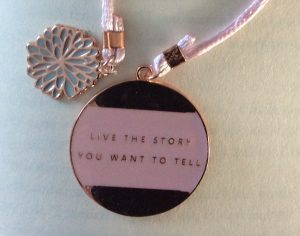 I don’t often blog about writing, but in the past few months I’ve been thinking about what and why I write.
I don’t often blog about writing, but in the past few months I’ve been thinking about what and why I write.
Whilst these experiences are mine, I suspect that published or not, other writers will recognize bits of themselves in me.
And if you’re a reader, I hope this post gives you some “inside insight” into the author world.
As a writer, I can’t help myself…
From eavesdropping on conversations when I’m out in public. To the chagrin of my long-suffering family, I’ve picked up many story nuggets this way.
I can’t help myself from hearing voices in my head as characters demand I tell their story. And I accept it’s a writer’s definition of “normal” and am mindful not to mention it when I see my doctor for an annual check-up.
I also can’t help myself from drifting off into my own little world. When I worked full-time in an office, I enlivened many dull meetings by multi-tasking—paying attention to the discussion with one part of my brain whilst escaping to an imaginary realm with the other.
I regularly reshaped colleagues into flirtatious debutantes or Regency rakes, a demure governess with a scandalous past, rugged cowboys, or versions of Jane Austen’s bumbling Mr. Collins.
As a writer, I’m vulnerable in a way that only those in other creative professions understand.
When I send my writing out into the world—whether it’s in the comfort of a supportive writing group, on the bigger stage of agent and publisher submissions, or ultimately, a published novel—I’m opening myself up to someone not liking my “book baby” and saying so, in often painful, public detail.
Logically, I know I don’t enjoy every book I read so it’s unlikely mine will be met with universal acclaim. However, logic disappears when I receive negative reviews or yet another stinging manuscript rejection.
I drown my sorrows in ice cream, learn what I can from the feedback and move on because rejections don’t stop post-publication.
As a writer, I can’t stop writing.
Rejections, bad reviews, or when life hits me with the force of a semi-trailer truck—there are times when it’s too painful to write and expose pieces of my heart on the page.
However, I always come back to it eventually, more determined than ever to tell those stories I can’t get out of my head.
 And sometimes, life hurts so much that I have to write. Then, in the midst of all-consuming emotional turmoil, my fictional world is the only place I can find a small, temporary measure of solace.
And sometimes, life hurts so much that I have to write. Then, in the midst of all-consuming emotional turmoil, my fictional world is the only place I can find a small, temporary measure of solace.
As a writer, I’m prey to a peculiar set of anxieties.
Beyond the obvious…will this book ever sell and, if it does, what if everyone hates it and, by extension me…I also experience a suite of other insidious concerns.
If I include sex in my books, will people who know me assume those scenes are based on personal experience? Mine aren’t, but when Tech Guy’s work colleagues discovered he was married to a romance writer, he got teased about “Fifty Shades of Tech Guy.”
I also obsess about margin width, font choice, adverb use, and comma placement to an inordinate degree, along with the worry that if anyone in “authority” ever checked my Internet search history, I’d likely be hauled in for uncomfortable questioning.
As a writer, happiness is finding my tribe(s).
I’m blessed to have a supportive husband and daughter (although when I’m on deadline, they know to not interrupt me unless blood, broken bones, fire or flood are involved), but it’s only other writers who truly “get” the writing life.
My writing BFF’s talk me off the edge when my career seems to have more “downs” than “ups,” and they don’t give up on me, even when I’m tempted to give up on myself.
As a writer, though, happiness is also finding my readers—the ones who truly “get” my writing.
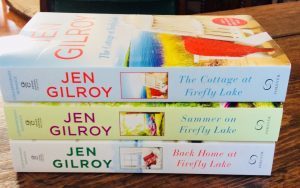 They’re the people who email to tell me they’ve “loved [my] books” and ask me about the characters as if they’re real.
They’re the people who email to tell me they’ve “loved [my] books” and ask me about the characters as if they’re real.
They’re also the people who buy my books when they can, request them at their libraries, write encouraging reviews, chat with me on social media and, over time, become friends.
Although (and like all jobs) the writing life can sometimes be hard and frustrating, it’s still the best job in the world and one I’m blessed to be able to do.
A subscription note:
Since Facebook in particular has made it increasingly difficult for those who want to see my author posts to do so, if you didn’t receive this blog via email and would like to, you can subscribe to my fortnightly blog post mailings here (and once you’ve subscribed don’t forget to opt-in via the confirmation email).
I also have a quarterly newsletter with book information and giveaways. Subscribe to my newsletter here and receive the Spring edition when it comes out next week.
March 15, 2018
Family…from generation to generation
 Since Tech Guy works in Toronto, English Rose and I spent this week’s school holiday there with him.
Since Tech Guy works in Toronto, English Rose and I spent this week’s school holiday there with him.
It’s been a time for our little family to have a whole week together (something we’re rarely able to do) and also visit with members of our extended family tree from “generation to generation.”
Although I’m an only child, I’m blessed to have a cousin who is the “sister of my heart.” While my visit with her was brief, it was nevertheless a time to reconnect in person after too many months of communicating via email and, in the midst of our busy lives, occasional telephone calls.
We chatted about topics of concern to most mid-life women—children, husbands and work amongst others. Yet, from the minutiae to bigger questions, we were reaffirming a family bond that extends back to our grandparents’ generation.
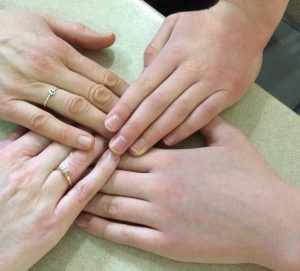 My cousin’s grandfather and my grandmother were brother and sister, raised in a family of ten children in a small Ontario town. That bond has extended down the generations—and across geographies—to encompass English Rose and my cousin’s tween daughter who are now forging a sister-like relationship of their own.
My cousin’s grandfather and my grandmother were brother and sister, raised in a family of ten children in a small Ontario town. That bond has extended down the generations—and across geographies—to encompass English Rose and my cousin’s tween daughter who are now forging a sister-like relationship of their own.
At the other end of the generational spectrum, we also visited Tech Guy’s mother who, because she has dementia, lives in a care home where she gets the around the clock help she needs to cope with everyday life.
For this once vibrant woman—who lived for her family, friends and faith—the world has narrowed to her room and the small community of the memory unit that is now “home.”
It’s also a world that usually doesn’t make sense to her, and where even close family are at best strangers, and at worst, ghosts in a shadowy and confusing reality.
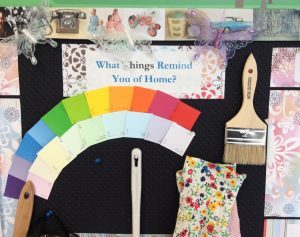 Yet, even in her here and now, family love remains.
Yet, even in her here and now, family love remains.
Although my mother-in-law did not recognize her son or granddaughter, when English Rose sang “You Are My Sunshine,” a song that my mother-in-law once sang to her young children, she joined in.
Her eyes were closed, and her voice faltered, but somehow, across the years, fragments of that special melody—with its reminder of the love of family and home —remained.
“Family” means different things to different people and sadly, not everyone is blessed with nurturing family bonds. Yet, whether it’s family by blood, or the family we choose (as Kylie, the troubled foster child chose Nick and Mia in my book, Summer on Firefly Lake), family relationships are a big part of who we are.
Like most women’s fiction and romance authors, my books are relationship driven. Alongside romantic elements, I also tell stories about families, friends and communities, often drawing kernels of inspiration from personal experiences.
It’s these inter-generational relationships that help us understand our past and also shape our present and future. And just as they have shaped my life, they are also the foundation of my fiction.
March 1, 2018
Springing forward
 When February slips into March and, irrespective of whether the new month comes in like a lion (as it has for my friends in the UK), or a lamb (here in the Rideau Valley), it’s the time of year when my thoughts always turn to my life in England.
When February slips into March and, irrespective of whether the new month comes in like a lion (as it has for my friends in the UK), or a lamb (here in the Rideau Valley), it’s the time of year when my thoughts always turn to my life in England.
Although there are many things I love about Canada, since I spent almost twenty years “across the pond” and am a dual national, England will always be my second home and have a special place in my heart.
I miss England most in springtime. British poets have long celebrated spring for good reason. There is a gentle and timeless quality to springtime in England I haven’t found anywhere else.
From the first snowdrops in February, to crocuses and daffodils in March, and then bluebells in the woodland in April and May, the English spring follows a slow and steady progression. In an often tumultuous world, I find this annual constancy both comforting and reassuring.
After months of darkness and rainy winter days, the return of the dawn chorus is also cause for celebration. Although Tech Guy bemoaned the cuckoo that called as regularly as an alarm clock outside our bedroom window from four-thirty in the morning onwards, it was an annual sign that spring was truly on its way.
Springtime is also a special season in England’s gardens, parks and historic properties, many of which reopen to visitors at this time of year.
One of my favourite places is Greys Court, a Tudor country house and gardens in the care of the National Trust and near the famous rowing centre, Henley-on-Thames in Oxfordshire.
From March through May, we visited Greys Court almost weekly to savour the sights and scents of the different spring flowers as they came into bloom.
We also often went there on Mothering Sunday (British Mother’s Day, this year on 10 March) for a walk in the grounds followed by a scrumptious afternoon tea.
In Canada, spring is a much brasher—and more rapid affair.
Where I now live in Eastern Ontario, spring often seems like a comma between a harsh winter and hot summer. It’s not unusual to go from wearing mittens and a parka one day to shorts and a sun top the next.
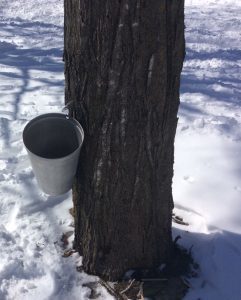 Along with collecting the sap in the maple trees (to make sweet maple syrup and other treats), spring here is also synonymous with “pothole season,” a consequence of warm days and cold night when water freezes under roadways and causes them to crack. The only beneficiaries of this significant driving hazard are car repair shops who count on an uptick in business at this time of year.
Along with collecting the sap in the maple trees (to make sweet maple syrup and other treats), spring here is also synonymous with “pothole season,” a consequence of warm days and cold night when water freezes under roadways and causes them to crack. The only beneficiaries of this significant driving hazard are car repair shops who count on an uptick in business at this time of year.
For gardeners, the spring planting is also much later here than it is in England with the frost-free growing season usually starting around 23 May.
No matter where or when I mark it, though, spring is always a time of happy firsts.
The welcome warmth of the sun on my face after a cold winter.
 A return to flip-flops and pedicures in place of boots and closed-toe shoes.
A return to flip-flops and pedicures in place of boots and closed-toe shoes.
And the day when winter tires can finally be swapped for summer ones.
Along with more hours of daylight, there’s also shopping for new spring clothes, the return of geese to local waterways, and ice cream time when seasonal stands reopen.
Although March can begin—and end—with a snowy reminder of winter’s bite, as we start these months of renewal, I wish you your own springtime joys and fresh starts—whatever they may mean.
And for my North American and other non-UK readers who may be tempted to visit England this spring, here are some links to get you started:
February 15, 2018
Love is…a few of my favourite things
Since February is the month of love, it’s a chance to celebrate a few of my favourite things and remind myself to be grateful for blessings big and small.
1. My family
Tech Guy buys me chocolate “just because.” And when I’m on deadline, English Rose makes sure I remember to eat.
In these and so many other ways, my family is my strength, compass and refuge.
2. Floppy Ears

My furry child gives me unconditional love, makes me laugh and is always there when I need a cuddle.
3. Female friendship
My female friends support and nurture me in life and writing.
4. My small-town life
For deep roots and a strong sense of community.
5. Ice cream
Because sweet treats make life better.
6. Shoes (and slippers)
With fabulous footwear, life is more fun.
7. Music
Because making and listening to music makes my soul happy.
8. Reading
For comfort, inspiration and joy.
9. Writing
Learning and growing my craft to tell the stories of my heart.
10. You, my readers.
And connecting with you virtually and in person.
Wishing you love and joy in February and all year through!
February 1, 2018
Happy first birthday to The Cottage at Firefly Lake!
 This week I marked a very special anniversary. It’s been a year since my first book, The Cottage at Firefly Lake came out, and I realized my childhood dream of becoming a published author.
This week I marked a very special anniversary. It’s been a year since my first book, The Cottage at Firefly Lake came out, and I realized my childhood dream of becoming a published author.
Publication day, 31 January 2017, was a day of excitement and a profound sense of achievement, mixed with a big dose of I-can’t-believe-it! The fact that characters who had lived inside my head for so long were out in the world in a “real” book was a thrill, but humbling and terrifying too.
Along with a flurry of online activity, publication week also included a lovely surprise—a tea party organized by Tech Guy who had secretly invited friends and family round to help celebrate my launch, complete with a fabulous, book-themed cake made by our friend Beth at Celebrate Cakes.
The months that followed were busy ones. When The Cottage at Firefly Lake was released, I was at different stages of working on both Summer on Firefly Lake (which came out in July 2017) and Back Home at Firefly Lake (December 2017).
One of the big adjustments to becoming a published author was having to work on multiple books at different stages at the same time. More than once, I had to double-check to make sure which book was on the screen in front of me, and I resorted to Post-it note reminders to help keep the characters (and the book they “belonged in”) straight in my head.
Since my first publication day, there have been many wonderful moments in my writing life, most often associated with kind feedback from readers.
There was the never-to-be-forgotten moment of my first reader email, as well as the joy of connecting with readers online via social media.
There was giving a talk about my writing at a local library and signing copies of my books at bookstores.
I’ve also enjoyed participating in blog tours and connecting with many lovely reviewers and readers through guest posts and other activities.
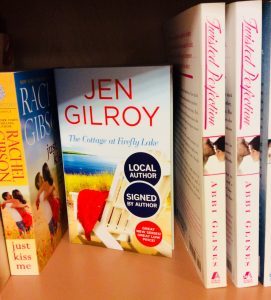 But for sheer shivers-down-the-spine excitement, I have to single out my first “shelfie”—seeing my book on a store shelf and taking a photo of it. As one of my favourite fictional heroines, “Anne of Green Gables” would say, it was “an epoch in my life.”
But for sheer shivers-down-the-spine excitement, I have to single out my first “shelfie”—seeing my book on a store shelf and taking a photo of it. As one of my favourite fictional heroines, “Anne of Green Gables” would say, it was “an epoch in my life.”
Most of all, this first year as a published author has been one of learning.
I’ve learned more about writing craft, particularly conveying emotion in fiction. And I’ve also learned about the business of writing and the publishing industry.
I’ve learned about friendship too and owe a huge debt of gratitude to my agent, Dawn Dowdle, and the writing friends whose steadfast support continue to help me navigate the author journey beyond initial publication.
And, not least, I’ve learned more about myself as both a person and a writer—what I value in life, how that shapes my fiction, and the kind of career I want to develop over time.
As I mark this first book anniversary, I’m looking back but also forward with new dreams, new goals, and new story ideas.
Thanks to you, my readers and friends, for being part of my life and writing and connecting with me in both the real and virtual worlds. I’m grateful for all of you.
January 18, 2018
Courage…and “learning to dance in the rain”
If you read my first blog of 2018, you know that the word I’ve chosen to guide me this year is “courage.”
Like all of us, my life has had its ups and downs. It’s through troubles, though, that I’ve found hope and inspiration to help me live courageously and grow.
Since much of that encouragement has come from books, as I start this new year with my new word, I’m stocking up on courageous reading, along with some wisdom from an unexpected source.
Courage in fiction
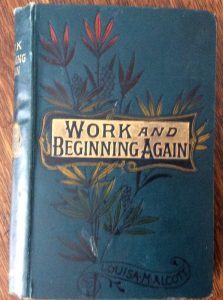 One of my go-to “comfort authors” is Louisa May Alcott. Although famed as the creator of Little Women, she also wrote a number of less well-known stories, some based on her experience as a nurse during the American Civil War (e.g. Hospital Sketches, 1863), and others inspired by her life as a woman working to support herself in what was then the new industrial age (Work and Beginning Again, 1872).
One of my go-to “comfort authors” is Louisa May Alcott. Although famed as the creator of Little Women, she also wrote a number of less well-known stories, some based on her experience as a nurse during the American Civil War (e.g. Hospital Sketches, 1863), and others inspired by her life as a woman working to support herself in what was then the new industrial age (Work and Beginning Again, 1872).
Throughout her life, Alcott faced many times of sorrow, disappointment and bitterness. But from “look for the learning” in any painful experience, to “I’m not afraid of storms, for I’m learning how to sail my ship,” her nineteenth century words still ring true in a twenty-first century world, and are amongst those I return to often.
Courage in life
At the moment, I’m reading How We Lived Then: A History of Everyday Life During the Second World War by Norman Longmate. Based on first-person accounts, it’s a compelling social history of how ordinary British people coped with extraordinary circumstances, facing adversity with not only courage but good humour.
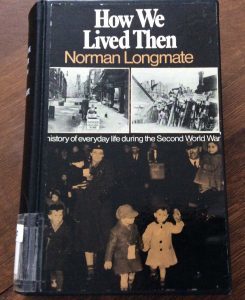 From food rationing to bombs, evacuation from homes and the loss of loved ones, along with the lighter aspects of wartime life such as films, songs and books, How We Lived Then is a powerful testimony to the resilience of the human spirit.
From food rationing to bombs, evacuation from homes and the loss of loved ones, along with the lighter aspects of wartime life such as films, songs and books, How We Lived Then is a powerful testimony to the resilience of the human spirit.
It’s also given me new appreciation for the hardships English relatives experienced in wartime and given fresh context for family memories.
In the summer of 1939, for example, my great-grandfather in Canada sent his daughter, then teaching in England, an urgent telegram summoning her home with passage booked on the last ship to cross the Atlantic before war was declared.
Years later, I knew her as an elderly great-aunt who wore pearls, served tea in ornate Wedgwood cups and smelled faintly of lavender. However, as an eager young woman she’d wanted to stay in England and do her bit for the war effort and resented being “packed home when things were getting interesting.”
And unexpected wisdom
Last week, I went to the bank safety deposit box where we keep family papers. Amongst the birth certificates and passports, a newspaper clipping slipped out, stuck inside a yellowed envelope.
It was about living in the moment and included something I often remember my late mother saying—namely, be as kind as you can because you never know what battle someone is fighting.
In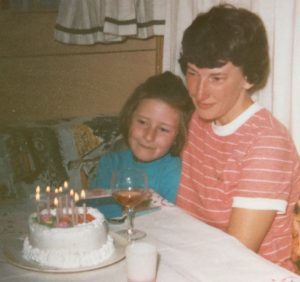 the margin, Mom had noted what the piece meant to her and underlined the following text: “Life isn’t about waiting for the storm to pass; it’s about learning to dance in the rain.”
the margin, Mom had noted what the piece meant to her and underlined the following text: “Life isn’t about waiting for the storm to pass; it’s about learning to dance in the rain.”
And there, when I least expected it, was another source of inspiration for my year of courage. My dear mom, who guided and helped me in life, was somehow there with words of wisdom from beyond the grave, just when I needed them.
As I move forward into 2018, I draw comfort from those who have gone before, finding strength and inspiration in the courage of their lives and examples.
And as always, I’m well stocked with ice cream, my comfort (and courage) food of choice!

